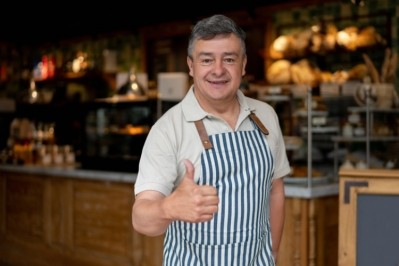From exploiting the SuperBowl to fighting malnutrition in Guatamala and scaling up Black smallholder farmers in South Africa: PepsiCo’s global head of Social Impact talks trends in the social impact space

According to a report from the Conference Board Environmental, Social & Governance Center, the top priority of 73% of responding companies was immediate relief and short term recovery, while only 22% prioritized disaster preparedness and just 3% prioritized long term recovery and reconstruction.
Glin revealed the Foundation’s approach to prioritizing both long term development and short-term humanitarian response with Bakery&Snacks.
Have you seen an inclination among businesses to prioritise crisis relief as opposed to social impact work?
I don't know about a prioritization but I think we typically respond to sort of what's in front of us. And recently there's been a number of humanitarian or climatic crises that have caught our attention, hitting the communities where we live, work and serve. So those tend to be the things that often get the attention of the day.
To some extent, that means long term planning could take a backseat to dealing with the urgent and immediate, but a balance is always needed.
What role do you believe the private sector should be playing in reducing global hunger, water insecurity and economic inequalities?
I think the private sector has a significant role in addressing issues like those we address at the PepsiCo Foundation, particularly for those underserved in communities where we live and work.
At PepsiCo, we have an end-to-end strategic transformation that we call PepsiCo Positive (Pep+). As one of the world's largest food and beverage companies, we want to be positive in the food system in which we operate. So, being positive in our agriculture; how we source the ingredients that go into our products; in our value chains. It also includes lessening GHG emissions; and being positive in the choices that we put out into the world – designed to really inspire and to bring joy.
If the communities where we operate are not thriving, then it's very difficult for business to thrive.
Like fashion or food, there are emerging trends in the social impact and philanthropy spaces. Can you tell us about these?
The first one is not necessarily merging, it’s emerged, but I think the pointedness and the emphasis that consumers are putting on some of these issues is what's really changing and transforming them to be ever present and to be emerging at the same time.
Sustainability, sourcing and traceability aren’t new issues, but I just think that more consumers are asking how our food was grown, where was it grown and where did it come from?
Those issues are really important to us as a Foundation linked to a global food and beverage company because we have to answer those questions on a daily basis.
We can also inspire with our answers, [for example, in talking about] our commitment on regenerative agriculture and to put a focus on not only the sustainable food system, but one that's inclusive; thinking about the smallholder farmers and particularly the female smallholder farmers in our supply chain. To make sure that everyone benefits as we do in developing and growing products and that we’re ‘leaving no one behind’, but also that we’re doing more good.
The next one won't surprise anyone because it’s shaping our world on a day-to-day basis and that's digitization.
It really does change the nature of the organizations that we engage with; those entities that are on the front lines of delivering cuisine to communities. When they’re suffering – and we saw this with the pandemic – we saw restaurants go out of business.
Now we’re back to this new normal, [which is] having us eat out, take away or carry out or deliver in more ways than we've ever imagined, so digitization is necessary and an emerging trend. How they plan, how they manufacture, how they distribute, how they sell their products, it's all digitized now.
There’s the things we can do as a company using our capabilities. Yes, our capital in terms of being a philanthropic entity is really important, but the capacity that we have [to introduce] digitization in foodservice – particularly Black and Hispanic foodservice providers, the ‘mom-and-pop-shops’ – helping them with an online presence, optimizing their online delivery programmes, their ordering programmes and marketing assets.
And lastly, everything right now is really about localization, so how do we get closer to the challenges that people in our communities face, but also, how do we help the solution providers develop and scale their solutions that are addressing societal needs at a local level?
And as we do so, thinking about the functionality of what we are producing. One example is the PepsiCo Foundation’s Food for Good program, where we source, pack and deliver those meals to schools. [Currently] in the US, one in eight child is food insecure; one in five or six Black or brown kids (Hispanic, African American or Latino).
Quaker Qrece is an integral program with a clinically proven intervention model that has demonstrated to overcome mild and moderate malnutrition in children between 2-5 years.
Quaker Bowl of Growth is a program built on three pillars – nutrition, awareness, education. Through this initiative, PepsiCo distributes Quaker Multigrain & Millet to malnourished children between the age of 3-5 years.
The Food for Good program also works with local schools to ensure that we can deliver meals for after school, weekend and summer programs. Hunger doesn't take a day off; it doesn’t operate within school days.
Foods now more than ever before have to have more than just the ability to just quell our hunger. So to be able to use our capabilities to address malnutrition and create a food product that tackles it head on is incredible.
An example of this is [a program currently running in] Mexico and Guatemala called Quaker Qrece. Our Quaker brand has created a therapeutic cookie, but not an ordinary cookie as you know it. I’s highly caloric and provided to parents of children to address nutrition.
We said let’s do the same in another region and now have a program in India called Quaker Bowl of Growth. The functionality is the same, but the formulation is different – not a cookie, but a porridge because the cultural relevancy is really important.
As you know, Africa is very close to my heart. Can you tell me about some of the work that you’re doing there?
I’m really excited about the work that we’re doing in Africa, because as a company we’re expanding our presence in countries like South Africa, Nigeria, Ethiopia and East Africa.
Africa is the youngest continent in the world, but it’s a continent that’s verging on two billion people in the next couple of years – especially [a cohort] that’s youthful.
Africa has the youngest population worldwide, with 40% of the population aged 15 years or younger in 2023, compared to a global average of 25%.
That can be a demographic dividend or a demographic bomb. A dividend in that it pays to invest in those young people so they can invest in their future; a bomb where these young people are restive and striving for inclusion and economic equality. The youth is not something that you want to play with if you really are talking about trying to have a peaceful, tranquil future.
We’ve also looking at unemployment and underemployment and have been able to work with organizations throughout the continent to invest in entrepreneurship and job creation.
Young people who are highly educated still don’t have opportunities to advance. We’re looking at that energy and ingenuity and asking how can we harness that into a space that we know really well, which is food and beverage and foodservice. So we’re investing in young African entrepreneurs, providing them with capital, capacity, building support, technical assistance. We're also connecting them through communications and community networks.
The Kgodiso Development Fund is a five-year, R600m ($31.5m) investment to help transform the food system in South Africa by prioritizing activities that support the growth and scaling up of Black-owned emerging farming enterprises and SMME businesses; promoting regenerative agriculture practices and encouraging innovation to revitalize local production.
We think these young people are the innovators and changemakers of today and tomorrow and by investing in them, we can add real value as a food and beverage company.
We still remain steadfast in working on issues such as malnutrition with school breakfast programs and job creation in South Africa, and access to safe water programs in countries like Nigeria and Ethiopia.
It’s really exciting to me as someone who spent a big part of my career focusing on Africa. I think it’s some of the most important work that we'll do that will ‘pay dividends for the for the future’.
Can you tell me about Pepsico's regenerative agriculture program?
PepsiCo is rooted in agriculture: sourcing more than 30 crops from 60 countries around the world. These are ingredients that go into all the major brands that people love, so it's important how we source these ingredients.
Regenerative agriculture – being a series of practises that regenerate the soil, the land where the crops come from – is essential to not only our survival as a company, but the farmers and the farming communities that we support and training them in these practises is really key for us. We have a commitment to [roll out] regenerative ag practices across 7,000,000 acres of land – basically our agricultural footprint as a company. But even in that we want to catalyze others to do more, so we’re partnering with major corporations, government entities and nonprofits to train American farmers in these practices.
Can you tell me about the Black Restaurant and Impacto Hispanic Restaurant Accelerators?
These programs focus on those who have been historically excluded or underserved. Through the National Urban League (our partner), we provide financial support to find, fund and develop these champions of cuisine and champions of community connections.
It’s available in 20 cities throughout the US, but [to apply, an entrepreneur has] to go through the National Urban League or community development finance institutions. These entities have their ears to the ground and their feet in the community.
Dining out is back and it's bigger than ever. So how do level the playing field within those populations that are on the forefront of providing us with a great cultural connection through the cuisine that put out there.
These programs link not only from a philanthropic standpoint, but also from a business standpoint. How do we provide them with grant capital and capacity building support, and also link them to the broader PepsiCo business to ensure they're able to grow beyond the grant assistance to have a real business relationship with us and others?
We're supporting the National Restaurant Association Education Foundation with financial support; again to think about the workforce of the future. It’s a holistic effort across PepsiCo to be a positive contributor to a more sustainable, inclusive food system.
On the other side of the scale, can you tell me about the PepsiCo Foundation's presence at the SuperBowl this year?
The SuperBowl is always an amazing event – an event that brings the world together – but unknown to most is what’s behind the glitz.
PepsiCo does more than advertising and marketing around the game.
The SuperBowl moves to a different city every year and it’s really central that those communities are a part.
Beyond the glamor, we support local communities to tackle issues like food insecurity. This year, we linked with a nonprofit partner called GENYOUth to provide meals to schools all over the nation, but particularly in the host city.
In partnership with GENYOUth, we were able to provide meals that fight childhood hunger and food insecurity and promote physical activity: in line with our PepsiCo Food for Good initiative as well.
We also partnered with GENYOUth on a program called Taste of the NFL, bringing celebrity and local chefs together for a wonderful, glamorous afternoon where culinary experiences are at a peak.























